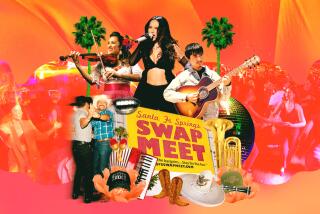EAST SIDE, WEST SIDE : Taking the Best From a Childhood of Spanish, Prayers and Rock ‘n’ Roll
- Share via
Can Latinos raised in Los Angeles in the ‘70s deny that the ‘Brady Bunch’ is just as potent a sign in their cultural topography as the Virgen de Guadalupe?” I ask as I look out at the mostly brown faces--brown like my own--staring back at me. The scene is a classroom in Bunche Hall at UCLA. I am a guest speaker in Prof. Raul Hinojosa-Ojeda’s class, Chicano Studies 125.
“You’re depoliticizing the issue of culture!” shouts a young man, his long, black hair tied in a ponytail that reminds me of my Mexican grandmother’s braids. “We have to recapture our historical identity and not allow ourselves to be defined by the white man.”
A Chicana jumps to my defense. “He’s only saying the obvious--that we grew up in a bicultural context. Why can’t we take from the best of both cultures?”
The nationalist is not impressed. “Yeah, right,” he scoffs, “like a little multicultural paradise.”
Coalitions! I say. We must have grand, cross-cultural, cross-class coalitions. The rising nationalism in Los Angeles--among Latinos and African-Americans alike--is driving a wedge between the two largest non-white ethnic groups in the city.
I decide to try the personal approach. To overcome my own private Third World War, I say, I had to make peace between “The Brady Bunch” and the Virgen de Guadalupe. I grew up in middle-class, liberal, multiethnic Silver Lake. In my bedroom, an image of Christ hung over my bed, and my mother and I recited prayers in Spanish every night. But the TV, the omnipresent TV! It was America at its best and worst. Obviously, “The Brady Bunch” was closer to the “worst” than the “best”--the epitome of suburban blandness.
My father gave me a copy of Ray Bradbury’s “Martian Chronicles” when I was in sixth grade, and later I read Walt Whitman’s “Leaves of Grass” and Ralph Ellison’s “Invisible Man.” Blending these with the Latin American poetry my mother loved, the cha-cha-cha and cumbia dancing at my parents’ parties, our trips to Rosarito Beach and feasts of Van de Kamp’s enchilada TV dinners, I had a wonderful, surreal hybrid of a childhood.
And then came the fall. Life beyond Silver Lake made it easy to see why one would hoist a nationalist flag. After years of trying to be Greg in “The Brady Bunch,” I realized that I wasn’t Greg and never would be. In Hollywood, the LAPD stopped and searched me--now a grown, brown man--just for carrying a backpack (filled with books). At the Glendale Public Library, an Anglo woman took one look at me and loudly announced that “these dirty Mexicans are everywhere.”
In defense of my heritage, I went on the offensive: I decided to purge myself of every last drop of the white man’s poison. Death to fake-wood-shingled, five-bedroom houses in the Valley! Declare East L.A. an independent republic! Every Taco Bell a legitimate target!
But this extremism didn’t work for me. For every Pat Buchanan type fanning the flames of xenophobia, there were other, truer Americans traveling the trail blazed by the Jeffersons and Whitmans. And what of my childhood? I couldn’t give up rock ‘n’ roll any more than my nightly prayers in Spanish.
Today, Movimiento Estudiantil Chicano de Aztlan is once again a powerful campus organization, and Chicano rappers (a curious phenomenon) extol the virtues of returning to Mexican roots. But Los Angeles is made up of many tribes, many colors, many languages. After 500 years of encountering influences from all over the globe and then molding them into a new culture, Latinos should be at the vanguard of ushering in an enlightened era. Why replicate the exclusionary policies of our supposed enemy?
I look into the sea of brown faces in Bunche Hall. The student with the ponytail has quieted down. Make no mistake, I tell him and all the others, there are battles yet to come. There is race and class rage throughout the City of the Angels--and many a cause worth fighting for. But everyone is everywhere now, so careful how you shoot.
More to Read
Sign up for Essential California
The most important California stories and recommendations in your inbox every morning.
You may occasionally receive promotional content from the Los Angeles Times.













